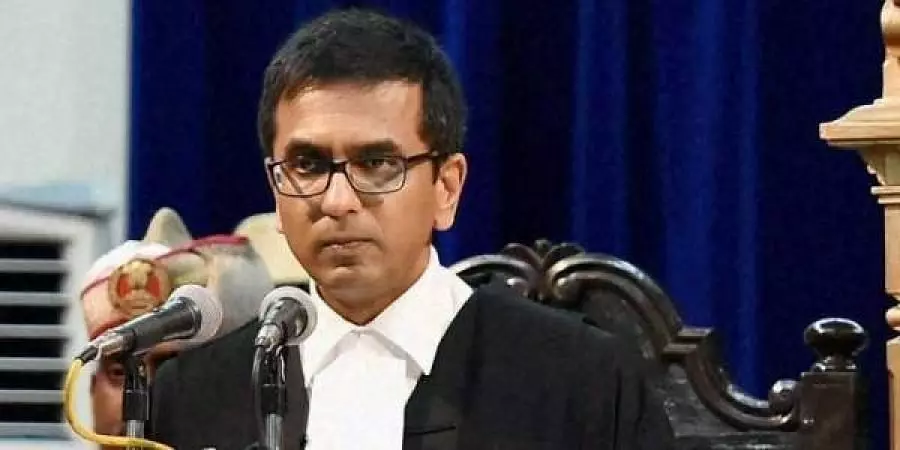
In the era of fake news, truth has become victim: CJI Chandrachud
text_fieldsNew Delhi: In the age of fake news and with the growth of social media, truth has become a "victim," according to Chief Justice of India D Y Chandrachud. What is said as a seed can now grow into a nearly complete theory that can never be tested on the anvil of rational science.
According to the CJI, people today lack tolerance and patience as a result of their unwillingness to embrace viewpoints that differ from their own.
Justice Chandrachud was speaking at the American Bar Association India Conference 2023 here on the theme “Law in the age of Globalisation: Convergence of India and the West”.
The CJI spoke about a range of issues, including technology and its use by the judiciary, especially during the COVID-19 pandemic, issues confronting the judicial profession and on having more women judges.
“Truth has become the victim in an age of false news. With the spread of social media, something which is said as a seed germinates into virtually a whole theory which can never be tested on the anvil of rational science,” he said.
Justice Chandrachud said in many ways, the Indian Constitution is a prime example of globalisation even before we ventured into the age of globalisation.
He said when the Constitution was drafted, its makers had possibly no idea of the lines along which humanity would evolve.
“We did not possess notions of privacy, there was no internet. We did not live in a world which was controlled by algorithms. We certainly did not have a social media,” he said.
“For every little thing that we do, and believe me, as judges we are no exception to this, for everything that you do, you face the threat of being trolled by someone who does not share your point of view,” the CJI said.
He said just as humanity has expanded with the global advent of travel and technology, humanity also has retreated within by not willing to accept anything that people, as individuals, believe in.
“And I believe that is the challenge of our age. Some of this is perhaps the product of technology itself,” he said, while also dwelling on the positives of technology.
Speaking about the time when COVID-19 had spread across the world, including India, the CJI said the Indian judiciary started video-conferencing in a very gentle way and then expanded it across all courts.
“What video-conferencing has done as a consequence of the pandemic is that it has led to a decentralisation of justice. And I think this decentralisation of justice is an important paradigm in promoting greater access to justice,” he said.
He said the Supreme Court of India is not the apex court of Tilak Marg at New Delhi but it represents the aspirations of citizens in the smallest villages in the country.
“And what better way to reach out to our citizens than to use technology as a part of our mission to take justice to the doorsteps of citizens,” he said.
“But, apart from technology, there are vital issues which confront the profession today. Chief among them is the reform of the legal profession itself. In so many ways, our profession is still patriarchal, our profession is feudal, our profession is built upon kinships and relationships of community,” he said.
Justice Chandrachud said globalisation has led to its own discontent and there are a number of reasons for this, for the meltdown which has been experienced the world over.
“One, I think the first of the origins of this lay in the terror attacks which took place in 2001. India was shaken up sporadically by these terror attacks... But 2001 was a watershed moment which brought to the global society the stark realities which India had already confronted for years and years before that,” he said.
The CJI said he is often asked about why we cannot have more women judges in the country.
He said the state of our institution today in terms of inclusion and diversity reflects the state of the profession two decades ago.
“Because the judges who come to the high courts today, say in 2023, or judges who come to the Supreme Court in 2023 reflect the state of the bar in the beginning of the millennium,” he said.
Justice Chandrachud said unless there was a level-playing field for women to enter and thrive in the legal profession between 2000 and 2023, there is no magic wand by which you will have apex court judges drawn from among women in 2023.
“So we have to create a framework, a groundwork for a more diverse and inclusive profession today if we truly have to create a future where our professionals will be more inclusive and diverse,” he said.
The CJI said the statistics on recent recruitment in the district judiciary in India indicate that in many states, more than 50 per cent are women.
He said the cause of that is the spread of education in India.
“As education spread in India, women education has gone up and there is today a perception on the part of middle class, the growing middle class in India, that the key to prosperity of an average Indian family is to educate their daughters,” he said.
The CJI also gave details of how the Supreme Court has adopted technology, including live-streaming of proceedings of the constitution benches and translation of judgements in regional languages.
With PTI inputs























